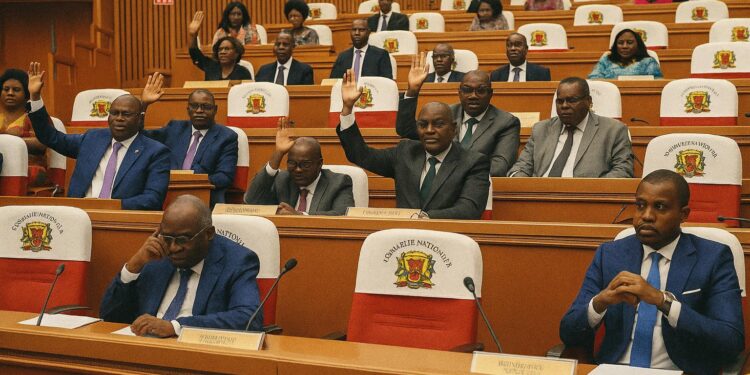Legislative Momentum in Brazzaville
The latest plenary sitting of Congo-Brazzaville’s National Assembly offered a revealing snapshot of the country’s evolving governance architecture. In swift succession deputies adopted four bills that, taken together, recalibrate the environmental, judicial and procedural underpinnings of the Republic. Diplomats observing the session read the agenda as a deliberate sequencing: first, a forward-looking environmental mandate; second, a consolidation of judicial integrity; and finally, two texts that streamline bicameral coordination. Such choreography underscores a legislative body intent on demonstrating institutional maturity at a moment when international investors and development agencies are benchmarking governance indicators with heightened scrutiny.
Genesis of the National Environment Agency
The creation of the National Environment Agency (ANE) is the centrepiece of the package. Conceptualised as an administratively autonomous public entity, the ANE draws its legal lifeblood from Law 33-2023 on sustainable environmental management and the newly promulgated National Environmental Policy Document. Environment Minister Arlette Soudan-Nonault described the agency as a “clearing-house for science-based decisions” that will curb biodiversity loss, regulate chemical pollutants and promote climate-resilient livelihoods. The ministry emphasises that the 1991 environmental law, admirable for its time, cannot by itself address today’s plastic proliferation, wildlife trafficking or the intricate web of commitments stemming from the Paris Agreement and the Kunming-Montreal Biodiversity Framework.
Aligning with Global Environmental Norms
By institutionalising the ANE, Brazzaville joins a cohort of Central African states that have elevated environmental agencies to cabinet-level influence, echoing recommendations from the African Development Bank’s 2023 Green Growth report and UNEP’s capacity-building assessments. The agency is mandated to draft technical opinions on all major public or private projects, an instrument that, if rigorously applied, could synchronise Congo’s emerging special economic zones with its commitment to reduce greenhouse-gas emissions by 32 percent by 2030 (UNFCCC submission, 2022). Development partners quietly welcome the move: the World Bank’s latest Country Partnership Framework cites predictable environmental clearance procedures as a prerequisite for concessional financing of infrastructure corridors linking Pointe-Noire to regional markets.
Judicial Reforms to Bolster Fiscal Integrity
Equally consequential is the statute conferring a dedicated status on magistrates of the Court of Accounts and Budgetary Discipline. Justice Minister Aimé Ange Wilfrid Bininga reminded legislators that the reform operationalises constitutional provisions adopted in 2015, bridging the gap between judicial prerogative and budgetary oversight. The new law elevates ethical benchmarks, delineates incompatibilities and enhances remuneration—measures calibrated to shield auditors from executive or commercial pressure. International financial institutions, notably the IMF in its 2023 Article IV consultation, have highlighted the Court’s role in reinforcing debt transparency as Congo navigates post-pandemic recovery.
Fine-Tuning Parliamentary Procedures
The Assembly also endorsed revisions to the rules governing parliamentary sessions held in joint congress and the operating framework of the bicameral mixed commission. These technical adjustments may appear arcane, yet they equip legislators with electronic voting and codified deliberative formulas, mitigating procedural impasses that have previously delayed fiscal legislation. Comparative constitutional scholars note that such refinements resemble best practices in francophone West Africa, where digital roll-calls have curbed challenges to quorum and expedited treaty ratifications.
Strategic Implications for Development Partners
Taken in aggregate, the new statutes depict a polity intent on harmonising domestic law with global norms while maintaining the policy coherence required by President Denis Sassou Nguesso’s Plan national de développement 2022-2026. Investors in carbon-credit schemes anchored in the vast peatlands of the northern departments will scrutinise the ANE’s early rulings as a bellwether of regulatory certainty. Concurrently, the upgraded Court of Accounts is expected to expedite certification of state financial statements, a condition precedent for several budget-support tranches pledged by multilateral lenders. Seasoned diplomats in Brazzaville therefore parse the week’s legislative docket less as headline theatre than as incremental, if understated, capacity-building—an approach often favoured in the Congolese political tradition.
Whether measured in hectares of conserved forest or in percentage points of domestic revenue mobilisation, the ultimate efficacy of these reforms will hinge on implementation. Yet the convergence of environmental ambition, judicial probity and procedural clarity signals a calibrated governance agenda that aligns national priorities with the evolving expectations of both citizens and international partners.











































